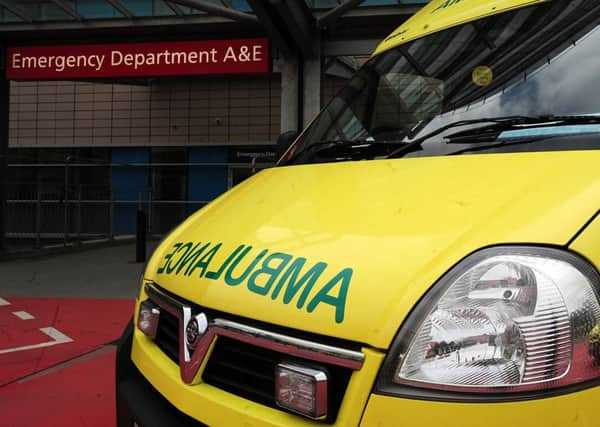Jayne Dowle: Don't add to the woes of an NHS at breaking point


If you’re in any doubt about the seriousness of the situation, just look at what other leading medics and hospitals are saying this week. A number of hospital trusts have already declared that they are Operational Pressures Escalation Level 4 (OPEL4) and that “there is increased potential for patient care and safety to be compromised”.
In short, this means that patients are at risk. Overcrowding in hospital A&E departments could, potentially, lead to patient deaths. In some areas there is such a shortage of ambulances – many are having to queue for hours to offload the sick and injured outside hospital casualty departments – that taxis are being used to ferry patients to hospital.
Advertisement
Hide AdAdvertisement
Hide AdMeanwhile, NHS England announces that the deferral of non-urgent elective care – such as hip or knee replacements – should be extended until the end of January at the earliest to free up beds for emergency cases. In order to divert doctors towards the countless patients who are turning up to A&E demanding urgent treatment, day-case procedures and routine outpatient appointments should also be postponed.
And just when it looked as if things couldn’t get any worse, there’s a major flu outbreak gearing up. Dr Nick Scriven goes on to warn that “reports of Australasian flu are beginning to appear which is worrying. We are seeing a lot of flu-like symptoms but as yet do not know if it is ‘normal’ or the Australasian strain”.
If this is not the NHS at breaking point, I don’t know what is. The situation calls for drastic action all round. And this includes you and me. I’m supposed to be having a routine operation to sort out a painful joint on my big toe – I’ll spare you the gruesome details of the procedure – but at this rate it won’t be happening until at least Easter.
I’ve been lucky not to trouble the NHS much in recent years, but this undertaking has given me a first-hand insight into some of the endemic problems which have contributed to this acute crisis.
Advertisement
Hide AdAdvertisement
Hide AdAnd although Health Secretary Jeremy Hunt – among those tipped to become Theresa May’s new deputy – should be doing much more to alleviate the acute pressures hospitals and healthcare are facing this January, I also think that we could all think twice about abusing the system we still have.
Let’s take prescriptions, for instance. A few years ago, the Department of Health estimated that more than £200m was being lost annually to the NHS through people claiming falsely for free prescriptions.
Just think what that £200m might be able to do in an overcrowded emergency department this week.
When the scale of fraud was recognised, Ministers promised that a scheme of vigilance would be put in place to enable pharmacists to check the credentials of those claiming to be in receipt of certain benefits or suffering from a long-term chronic medical condition. Well, it’s not happening at my local pharmacy.
Advertisement
Hide AdAdvertisement
Hide AdI had to pick up a prescription for a short course of tablets as part of my operation pre-assessment checks. As I got out my cash to hand over the required sum of £8.60, the pharmacist looked surprised. “Oh, do you pay for your prescriptions?” she asked.
By this point I had been waiting to be served for about half an hour and my nerves were slightly frayed. “Yes, I do,” I replied with indignation. “Doesn’t anyone else?” And the pharmacist shook her head. This was just one pharmacy, in one doctor’s surgery, in one village. If this abuse is happening all over the country, is it any wonder that NHS finances are in such a mess?
I’m sorry to sound draconian, but claiming free prescriptions when you are in employment and in general decent health is not acceptable. And surely, hard-working pharmacists should be there as a frontline resource to offer advice and relieve pressure on family doctors and A&E, not be expected to act as de facto benefits inspectors.
It’s up to each of us as individuals to examine our consciences and not claim for things we are not entitled to.
Advertisement
Hide AdAdvertisement
Hide AdIt’s also our responsibility to think twice before taking up the valuable time of our GPs with minor ailments, especially at this time of year. Again, sorry to be harsh, but it’s time to toughen up. There’s no tolerance for malingering in today’s NHS. And if we’re lucky enough to secure one, we certainly should not be missing or cancelling those precious medical appointments, another practice which also costs millions.
If we can’t help our own health service, who can? In its hour of need, spare a thought and do your bit.